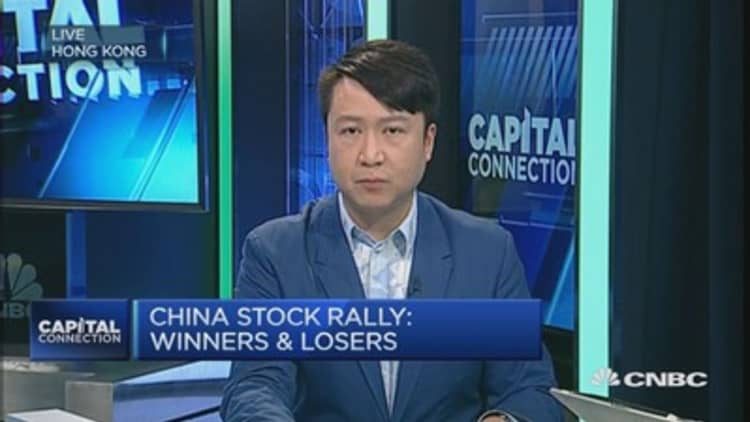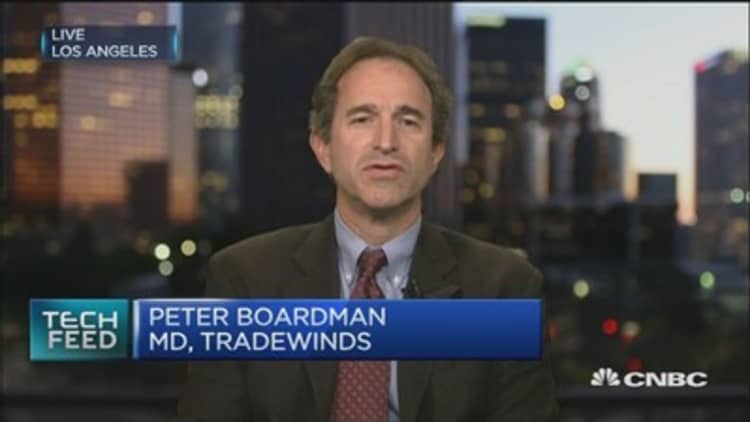Stock markets in Shanghai were the biggest laggards on Friday after coming under liquidity pressure, while the rest of the region advanced on the back of an impressive lead from Wall Street overnight.
Overnight, U.S. major indexes rallied one percent higher each on the back of calmer bond markets and a weaker dollar. The S&P 500 set a new closing record of 2121 after a 1 percent surge. The Dow Jones Industrial Average and tech-heavy Nasdaq rose 1 and 1.4 percent, respectively, to come within 50 points of their record highs.
Mainland markets mixed
China's Shanghai Composite index closed down 1.6 percent, despite the country's securities regulator's attempt to calm market jitters regarding new share listings.
According to Reuters, China Securities Regulatory Commission chairman Xiao Gang said at an industry conference on Friday that the stock market would not be "hugely" impacted by an increase in initial public offerings which began last month. The comments came after a relatively disappointing week for mainland stocks, a stark contrast from the world-beating rally that has been taking place last November.
China Vanke eased 3 and 0.6 percent in Shanghai and Hong Kong, respectively, after it announced a partnership with fellow property giant Dalian Wanda Group's commercial arm. Some experts say the strategic alliance of two major developers suggests that recent easing measures by the central bank have yet to take effect.
"It sounds a little bit like consolidation. We haven't seen the impact from easing measures come through... so it's still a pretty tough environment," Mark Konyn, CEO of Cathay Conning Asset Management, told CNBC Asia's "Squawk Box."
Meanwhile, internet stocks extended gains as China announced plans to accelerate the development of its high speed broadband networks.
Over in Hong Kong, the index widened gains in the afternoon session to close up 2 percent ahead of the city's first-quarter growth figures due later in the day. Hong Kong's economy may have expanded 2.0 percent in the January-March period, slower than the 2.2 percent in the previous quarter, according to a Reuters poll.
Hong Kong Exchanges and Clearing led advances by soaring over 5 percent.

Kospi drops 0.7%
South Korea's key Kospi index turned negative after the Bank of Korea kept interest rates unchanged for a second straight month and eventually closed down on Friday. The Seoul bourse had risen as much as 0.5 percent earlier in the session, but lost momentum after heavyweight components reversed direction.
Samsung Electronics is in focus following the company's announcement that heir apparent Jay Y. Lee will take over from his father Lee Kun-hee as head of two key foundations. Shares of the South Korean tech giant finished 1 percent lower.
Korean Airlines announced a wider-than-expected net loss for the first three months of 2015 late Thursday, and shares of the national carrier fell 0.8 percent.
Top performer Shinsegae rebounded 1 percent after briefly dipping into the red. The department store giant rose as much as 5 percent in the morning, which propelled the stock to its highest level since October 2013. Buoyed by the company's plan to operate a duty-free shop in central Seoul and Tuesday's release of better-than-expected first-quarter earnings, the retailer has risen over 20 percent this week.
Meanwhile,
Read MoreWho gets to decide Japan is cool?
Nikkei rises 0.8%
Japan's Nikkei 225 index got a reprieve from receding volatility in bonds and as the yen ticked up 0.2 percent to 119.40. The fall in dollar-yen on Thursday, sparked by the selloff in global bond markets, sent jitters through the equity market and led the Tokyo bourse down 1 percent to a near one-week low.
However, it was the decliners that hogged the spotlight on Friday. Nikon plunged 11 percent following a weak earnings forecast, while Sharp closed down 7 percent after announcing that it has secured a $1.7 billion bailout from banks on Thursday, marking its second major rescue in three years. The loss-making electronics giant will also embark on further restructuring that includes a 10 percent cut of its global workforce.
Another laggard was airbag maker Takata, which slumped 2.6 percent as Honda recalled an additional 4.89 million cars equipped with faulty airbags on Thursday.
Among gainers, Dentsu surged 14 percent, touching a record high of 6,210 yen during intra-day trade, after announcing a share buyback plan and raising its dividend outlook.

ASX gains 0.7%
Australia's S&P ASX 200 index finished the week at a seven-day high, supported by an impressive lead from the U.S. alongside a modestly weaker Australian dollar.
Financial plays ended higher across the board, except for National Australia Bank which tanked nearly 3 percent as it traded ex-dividend. Commonwealth Bank of Australia and Australia and New Zealand Banking ended 1.4 and 0.3 percent higher, respectively.
Retailers outperformed the bourse, with Myer and JB Hi-Fi leaping 3 and 1.9 percent, respectively. Medical device maker ResMed recouped 3.86 percent after an 18 percent tumble in the previous session.
Read MoreOCBC warns of tough credit environment ahead
Southeast Asia
Singapore's Straits Times index overcome a mixed bag of earnings releases to close up 0.2 percent.
Casino operator Genting Singapore plummeted 5.4 percent after reporting a crash in first-quarter net profit, down 64 percent, as its premium gaming business stays under pressure. Meanwhile, a 47 percent jump in fourth-quarter net income, thanks to lower jet fuel prices, helped Singapore Airlines to notch up 0.3 percent.
Commodity trader Olam International made losses of 0.5 percent following a 92.1 percent slide in first-quarter net profit due to a bond buyback.
Malaysian shares traded flat after first-quarter gross domestic product (GDP) came in at 5.6 percent, beating Reuters estimates of 5.5 percent but failing to match the 5.8 percent growth in the previous quarter.

